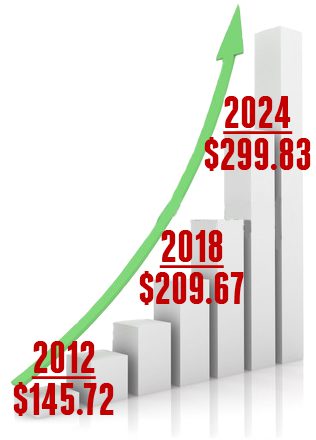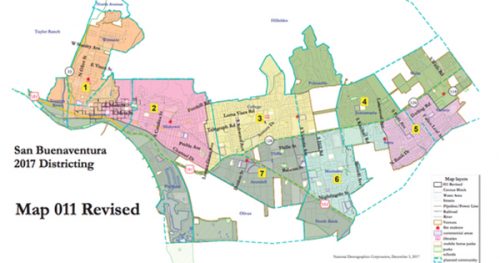Ventura Water Has A Wonderful Opportunity To Be More Transparent

“The single biggest problem in communication is the illusion that it has taken place.”
— George Bernard Shaw

In Ventura, the city staff uses the Brown Act to do precisely the opposite of what lawmakers created it to do.
The California Brown Act guarantees the public’s right to attend and take part in meetings of local legislative bodies. Legislators designed it to end “back room” deals and bring local government out into the open. Ventura Water uses it to throttle the flow of information instead.
Oversight By The Water Commission
Ventura established a Water Commission to advise Ventura Water. The Commission is to review and make recommendations about:
- Water rates
- Water resources infrastructure projects
- The integrated water resources management plan
- Water supply options
- The Urban Water Management Plan approval process
- A water dedication and in-lieu fee requirement
- Other water resource issues
Before the Commission, Ventura Water operated with little oversight. Even with the Water Commission, it continues to control all meeting agendas and minutes. At best, this restricts the flow of information to the City Council. At worst, information flow is non-existent. The City Council doesn’t receive any meaningful information that may help with their future choices.
Here is how Ventura Water does things today:
- Ventura Water’s General Manager and the City Attorney make and approve all agendas. The Commission can only discuss agenda items at the meeting. Any deviation may violate the Brown Act.
- The General Manager controls all minutes for all sessions. Minutes reports only action items, eliminating the record of any discussion.
Circumventing The Water Commission
 Ventura Water forces the City Council to get their information from the General Manager. Thus bypassing the entire reason the city established the Water Commission.
Ventura Water forces the City Council to get their information from the General Manager. Thus bypassing the entire reason the city established the Water Commission.
Rarely does Ventura Water share the discussion on relevant topics—if ever. Debates over issues are not reviewed or scrutinized. Important issues never enter the public record such as water quality, testing quality results, fees, costs, timelines, water capacity, water usage, what other agencies are proposing, and deposit account balances.
Because minutes show only action items, all discussions of issues are as though they never happened. So, when the City Council looks to the minutes for any records of problems or concerns, the minutes are no help. Nor are they sufficiently transparent to Ventura’s citizens.
Communicating Clean Water Safety Violations
Ventura Water deals with a water system that impacts all Ventura citizens directly. In August 2018, the department violated the Federal Clean Water Safety standards. Ventura Water breached the Total Trihalomethanes (TTHM) drinking water standard in August. The U.S. EPA regulates TTHM at a maximum allowable, annual, average level of 80 parts per billion. Any amount above 80 ppb results in harmful health effects over time. Ailments such as cancer and adverse reproductive outcomes can happen. Ventura Water has corrected the problem, but that’s not the issue.
At issue is how the utility communicated the problem and the solution.
Why You May Not Have Heard Of This
 You may not have heard about the incident. It’s not because Ventura Water didn’t announce it. They did. Ventura Water fulfilled the letter of the law, but it may have missed the intent behind it. Meeting the legal requirement seems to be the minimum standard. Yet setting the bar at the lowest level may place everyone’s health at risk in the future.
You may not have heard about the incident. It’s not because Ventura Water didn’t announce it. They did. Ventura Water fulfilled the letter of the law, but it may have missed the intent behind it. Meeting the legal requirement seems to be the minimum standard. Yet setting the bar at the lowest level may place everyone’s health at risk in the future.
What wasn’t said is as important as what was said. Bathing in or cooking with the TTHM water was not mentioned, for instance.
Open communication is what builds trust with a public utility during a crisis. The TTHM violation happened in the Pierpont Area. Unless you live in the affected area, Ventura Water would not have contacted you by mail. Ventura Water notified the schools and nursing homes in the area. Schools and nursing homes informed the parents or residents at their discretion.
Ventura Water obeyed the “letter of the law,” but failed to respect the spirit of the law. They reported the incident to residents in the affected area by mail, posted it on their website, and took out an ad in the Ventura County Star.
Not The Only Incident In 2018
 In July, Ventura Water withheld information from the Water Commission. A panel of experts examined Direct Potable Reuse (DPR) of treated wastewater. There are no quality standards or guidelines today. The experts found DPR (for drinking purposes) was a threat to public safety. The City Council did not know that. They were only alerted to that fact after private citizens brought it to their attention. The result was, the City Council decided not to use DPR as an alternative for now. Still, the staff soldiers on asking for large sums to build projects for DPR.
In July, Ventura Water withheld information from the Water Commission. A panel of experts examined Direct Potable Reuse (DPR) of treated wastewater. There are no quality standards or guidelines today. The experts found DPR (for drinking purposes) was a threat to public safety. The City Council did not know that. They were only alerted to that fact after private citizens brought it to their attention. The result was, the City Council decided not to use DPR as an alternative for now. Still, the staff soldiers on asking for large sums to build projects for DPR.
There are many laws to protect citizens and keep them informed about what happens in city government. When a government agency does the bare minimum but goes no further than the law requires, regardless of the impact and financial consequences, citizens mistrust it.
Editor’s Comments
Ventura Water needs to be more transparent. The City Council allows it to operate in secrecy and subterfuge. Stop. Ventura’s citizens deserve and expect open communication. Here’s what the Council should do:
First, make hiring the next General Manager a priority. Insist City Manager Alex McIntyre interview the Water Commissioners. He should do this without Water Department staff present. The goal is to get the knowledge and details of Ventura Water over the past fifteen years. He’ll gain the perspective to understand what lies ahead in the next six years.
Second, have the Water Commission’s Chairman set the meeting agendas, with input from all commissioners.
Third, ensure all Water Commission’s minutes reflect topics and discussions from all meetings.
Fourth, have the Water Commission Chairman provide a written report to the City Council on a quarterly basis.
Fifth, expand the communication channels Ventura Water uses to inform the public. Set the standard higher than the minimum legal standard.
Insist The City Council Makes Ventura Water More Transparent
Below you’ll find the photos of our current City Council. Click on any Councilmember’s photo and you’ll open your email program ready to write directly to that Councilmember.
 |
 |
|
 |
 |
|
 |
 |
|
 |
For more information like this, subscribe to our newsletter, Res Publica. Click here to enter your name and email address.



 “I have never understood why it is ‘greed’ to want to keep the money you’ve earned, but not greed to want to take somebody else’s money.”
“I have never understood why it is ‘greed’ to want to keep the money you’ve earned, but not greed to want to take somebody else’s money.” 

 In March 2012, the Ventura City Council signed a Consent Decree that requires Ventura Water to stop putting 100% of its treated wastewater into the Santa Clara River estuary by January 2025. The decree stems from a Federal complaint filed by Wishtoya Foundation. Former City Manager, Rick Cole and Ventura Water General Manager, Shana Epstein, signed the consent decree on behalf of the city. The city no longer employs either of them.
In March 2012, the Ventura City Council signed a Consent Decree that requires Ventura Water to stop putting 100% of its treated wastewater into the Santa Clara River estuary by January 2025. The decree stems from a Federal complaint filed by Wishtoya Foundation. Former City Manager, Rick Cole and Ventura Water General Manager, Shana Epstein, signed the consent decree on behalf of the city. The city no longer employs either of them.









 City Manager
City Manager Water Department’s New General Manager
Water Department’s New General Manager








